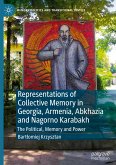Essays in Memory of Jan-Georg Deutsch
The volume observes some of the principles that drove Prof. Jan-Georg Deutsch's research: highlighting present-day politics for the way they shape historical remembrance, learning from people on the ground through fieldwork and oral history, and bringing various parts of the African continent into discussion with one another.
From Cape Town to Charlottesville, many societies are grappling with historical consciousness and the production of public memory. In particular, how and why societies remember and forget, what should serve as symbols of collective memory, and whether there exists space for multiple memory cultures are questions being vigorously debated once again. These discussions present particular challenges not only to official memory bound to ideological constructions of nationhood but also to the teaching of history and its links to social justice movements.
The volume re-centres Africa and African history in memory studies, with each chapter drawing parallels to comparable cases in Africa and the world. An underlying assumption is that what can be learned from the politics of historical memory in Africa will have relevance for contemporary politics globally and for understanding how memories can be mobilised for political ends.
The volume observes some of the principles that drove Prof. Jan-Georg Deutsch's research: highlighting present-day politics for the way they shape historical remembrance, learning from people on the ground through fieldwork and oral history, and bringing various parts of the African continent into discussion with one another.
From Cape Town to Charlottesville, many societies are grappling with historical consciousness and the production of public memory. In particular, how and why societies remember and forget, what should serve as symbols of collective memory, and whether there exists space for multiple memory cultures are questions being vigorously debated once again. These discussions present particular challenges not only to official memory bound to ideological constructions of nationhood but also to the teaching of history and its links to social justice movements.
The volume re-centres Africa and African history in memory studies, with each chapter drawing parallels to comparable cases in Africa and the world. An underlying assumption is that what can be learned from the politics of historical memory in Africa will have relevance for contemporary politics globally and for understanding how memories can be mobilised for political ends.








